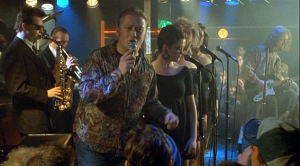I’ve often wondered how it’s possible for non musicians to write about music. Indeed, writing about music can be pretty tough because words don’t convey sound, only an approximation and then only in the very best poetry.
When I was young and cool (HA…not sure the ‘cool’ bit ever happened but, hey, I can dream!) I used to read the British music weekly New Musical Express (NME for short) a publication covering the then popular genre of rock and roll. I always found the ability of journalists to describe what they heard to be remarkably limited. The, then really popular, BBC Radio 1 show Steve Wright in the Afternoon used to feature a comedy character called The Music Journalist who would describe everything as a remarkable ‘sonic cathedral of sound’. Which wasn’t too far from the NME.
The great Roddy Doyle novel, ‘The Commitments’, about a soul band forming and breaking up in the Irish capital, Dublin, of all places, is equally unable to describe the music it’s trying to depict. You’re left to your own knowledge and memories of Wilson Pickett, James Brown and others.
This is why Alan Parker’s movie of ‘The Commitments’ is so much better than the novel; you see and hear the real sound of the music; even if Doyle’s writing is witty, full of life and gives you a good grounding in a moment of the lives of some ‘typical’ Dubliners.
1991, the year ‘The Commitments’ movie appeared, I saw Bertrand Blier’s ‘Trop Belle Pour Toi’ (Too Beautiful for You) for the first time. It’s a slightly strange telling of the manager of a car dealership (Gerard Depardieu) falling out of love with his beautiful wife (Carole Bouquet) and into love with his plain, frumpy secretary (Josiane Balasko).
We see dream sequences in which Balasko tells the car salesman how she thinks he will leave her; dinner parties thrown by Depardieu and Bouquet in which the tension and pressure to stay with such an accomplished, beautiful woman is palpable.
The whole film feels like a dream. At the centre of it is a piece of music, Franz Schubert’s ‘Piano Impromptu No. 3’. At one point, Depardieu is listening to this whilst his family are asleep, he simply says “this music, it shatters me”. When I heard it and saw this, I was helpless. If ever there was music to fall in love to, this is it.
Now that I’ve thrown up my hands at the difficulty of describing music with words, I’m going to attempt to tell you why this music reduces me to a misty eyed jelly. There is a problem, I can’t read or write music, my descriptive abilities in musical theory are non-existent. So this is going to be difficult.
But here goes.
This is a work meant for piano, you don’t hear any other instrument. The first couple of bars are wonderfully delicate, tender and tentative as if beginning is something to be shy of. As the main motif moves on, a fluttering as if in a gentle breeze picks up underneath it.
What’s that about, you might wonder? The main sound gives you an aching, yearning of the kind you feel when what you need is in sight but only a fingers length out of reach. The piano breeze tells you what’s going on in the heart, the gentle emotion rising to near fever, calming and building again; whilst the main tune (how inadequate that word is here) keeps up a front of ‘should I, shouldn’t I?’ At the half way point, the keys are struck so gently it’s hard to believe they’ve been touched, more they’ve been breathed on to produce the lightest of chimes.
I’ve always had a sense of two people coming close, moving away, raising their hands in a half gesture before pulling back. All the while, what they’re thinking, the pounding of the heart remains private and unspoken, without needing to be spoken.
Sometimes the couple is faced with the storm of circumstance trying to pull them apart; be it personality, family, work, whatever. If they’re meant for each other, the couple might be inviolable regardless of what happens, like a lighthouse on the edge of an ocean hurricane.
It finishes with the same heartbreaking ache that began it, if maybe more knowing and understanding than before. All achieved without words, without touch; only through the most delicate, intricate of sounds barely registering but doing so powerfully.
This is what’s going on in this piano impromptu. No other music moves and touches me in quite the way this does.

